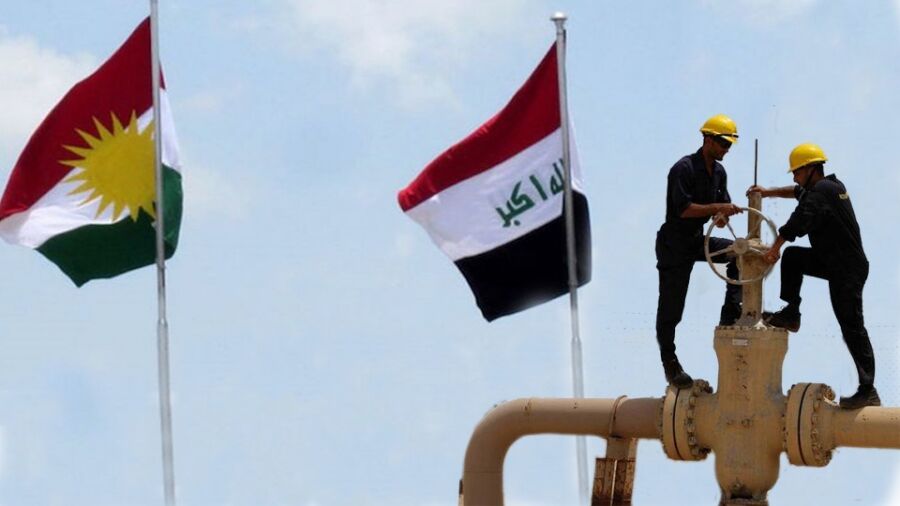Alireza Majidi told the Strategic Council on Foreign Relations that in the Iraqi constitution, which was written between 2003 and 2005, the borders between the Kurdistan Region and the central government are not specified; The main problem in this field is the four regions of Kirkuk, Khanaqin, a region in the east of Nineveh and a region in the extreme west of the Kurdistan Region, or Sinjar. Of course, the main area of difference is Kirkuk.
He added that it has not been specified in the constitution of Iraq if an area like Kirkuk belongs to Baghdad or Irbil while Kirkuk is rich in oil and has constituted a serious point of difference.
Referring to the atmosphere of developments in Iraq during 2005 and 2017 particularly after the emergence of Daesh, he said these developments stabilized the one-way control of the Kurdistan Region on Kirkuk.
“In the Iraqi constitution, it is stated that foreign relations are the monopoly of the central government. This means that Erbil has no right to have foreign relations independently from the central government”.
Majidi added that this issue was also a controversial issue, whether foreign relations mean official diplomacy such as having an embassy or consulate, or does it include any type of foreign relations, including oil, etc., and diplomatic relations?
According to this expert, since this issue has not specified in the constitution, it has opened the space for interpretation, and when the space for interpretation is opened, power automatically plays an important role.
He said that from 2005 to 2014, the Iraqi foreign minister in Baghdad was a Kurd and belonged to the Democratic Party, adding that this party was presiding over Irbil and this caused some impunity for the region to continue its track.
He added that in 2014, the foreign minister of Iraq was replaced at a time Iraq was fighting Daesh however the federal government defined a series of boundaries and instructed Irbil against establishing foreign relations independent from Baghdad.
Majidi emphasized that in that period, Foad Hussein, the Iraqi Minister of Economy belonged to the Democratic Party and allowed Irbil to establish commercial and oil relations with abroad independent from the federal government.
Referring to the intensification of differences between Irbil and the federal government in 2017, Majidi said Erbil held a symbolic referendum for independence and Heidar al-Ibadi, the then Iraqi prime minister instructed the army to take control during a military operation of Kirkuk, Nineveh, Khanaqin and other areas of dispute and retain national sovereignty over these areas.
At the height of the conflict between Erbil and Baghdad, Baghdad did not enter into oil disputes beyond Kirkuk and somehow managed these differences to hold elections from the end of the second half of 2017 to the end of 2018 when the new government was formed.
Majidi said that in this situation, Erbil had started a large-scale oil trade independently of Baghdad, and even parties like the Zionist regime buy oil from Erbil.
The expert on Iraqi issues stated that during the government of Adel Abdul Mahdi, Iraq entered a period of instability and explained that “the government of Abdul Mahdi was shaky from the first day and the weakness of the central government made it impossible for Baghdad to enter into the issue of regional oil from 2018 onwards; But since March 2020, when Mustafa Al-Kazemi took office, the situation has changed.”
Al-Kazemi was following a different type of interaction with Erbil and basically he was not looking for 100 percent confrontation and interaction with Erbil, but he was looking for a suitable platform so that both sides could work properly with each other.
Majidi emphasized that in such circumstances, the federal government did not go tough on the trade of oil from Erbil; however, al-Kazemi tenure has ended and the Supreme Court of Union is now in control as al-Kazemi is only administering the affairs from the beginning of 2022.
“Among the rulings issued by the Supreme Court of the Union, which is the Supreme Constitutional Court, was that Erbil does not have the right to sell oil independently. In this situation, Erbil boldly entered the political games of Baghdad. At the same time, on the one hand, the full Shia Coordination Framework was standing strongly against Erbil, and on the other hand, within the region, the differences between the parties had intensified”.
Asked about the expel of three American oil companies and its impact on the relations between the Kurdistan Region and the federal government, he said everything depends on the composition of the future government.
“Now, with the withdrawal of Moqtada Sadr from the parliament, the triple coalition does not have the upper hand. Recently, we saw that the Kurdistan Democratic Party sent two people to negotiate with the two poles of the coordination framework; That is, Foad Hossein entered into negotiations with Hadi Al-Ameri and another delegation with Nouri al-Maliki.”
Majidi added that the Kurdistan Democratic Party is aware that a big portion of this deal is related to the type of approach of the next government and therefore the party is entering the internal equations of Baghdad to be informed of the policies lines of the future government.
“If the Iraqi government is not formed in the near future, and the al-Kazemi government stays in place, and especially if the parliament is dissolved, Erbil would probably move towards opening new communication channels for the sale of oil independent from Baghdad. However, if Baghdad moves towards forming a government, everything would depend on the new cabinet which is likely to take tougher and more serious stance against Erbil.”










0 Comments